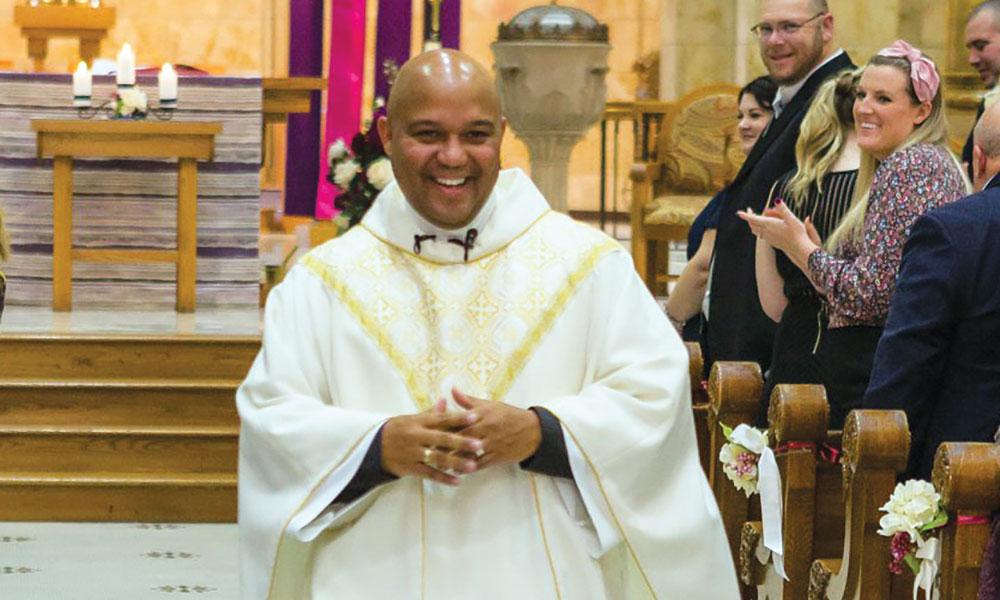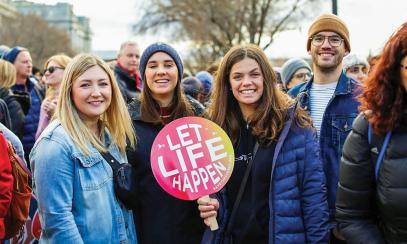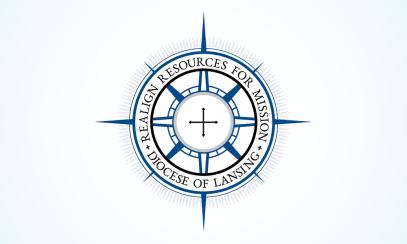
Father Norman Fischer
FAITH talked with Father Norman Fischer, the first black/Filipino priest in the Diocese of Lexington, Ky., after incidents in Ferguson, Mo., and New York. He spoke of the issues of racism that have now led to the killing of George Floyd, and the subsequent protests against brutality.
Father Fischer, as you reflect on recent events, what do you think is at the heart of the problem?
We have lost sight of the basics. Each one of us, regardless of race, gender, country of origin or age, is created in the image and likeness of God; is created for eternal life in communion with God. This means that every human being has an infinite value and dignity. Every human life is indeed sacred.
Unfortunately, the roots of the problem go back to the beginning. After the fall of our first parents, we read how their son Cain murdered his brother Abel in a fit of rage and jealousy. Cain, in effect, introduced an-other rupture in the human family through his actions. Since then, violence has been largely accepted as a part of human nature.
Then, as today, we do not seem to want to deal with each other. We do not want to take the time or the energy to enter into the other’s experience. We do not have the pa-tience necessary for the fruit of compassion to be borne in our hearts. Instead, we are tempted to take the path of least resistance in dealing with others, that is, all too often we choose to eliminate or disregard the other altogether.
Of course, Jesus Christ came precisely to undo all of this by submitting himself to the senseless violence of the cross. And Christ continues to offer us a way out of violence through love of God and neighbor.
What about the current cultural climate of mistrust that seems to dominate the media relationship be-tween local authorities and the African-American community?
The distrust that exists between members of the African-American community and many others and the police is very real. The incidences and outcomes in Ferguson, Cleveland and Staten Island, for example, clearly are triggers that bring this distrust out into the open.
From the perspective of the black community, in such cases, the police are experienced as an aggressor to, rather than as the defender of, the community. Likewise, the failure to indict the police officers in Ferguson and Staten Island is interpreted as evidence that the justice system just doesn’t seem to care. The subsequent protests are the crying out of a humanity who is asking, “Who is my brother’s keeper?” As Dr. Martin Luther King, Jr. noted, “A riot is the language of the unheard.” At the same time, from the perspective of law enforcement, I am sure they suffer from this same cycle of distrust and fear that we are now seeing spiraling onto the streets of cities throughout the U.S.
What can be done to begin the hard work of overcoming these perceptions and of restoring these broken relationships?
First, I think it is imperative that we name any fears with those among us. After all, Jesus has told us to “be not afraid.” By acknowledging what these fears may be, we can perhaps disarm our knee-jerk reactions and the behaviors that flow from fear. Only by being aware of our fears and preconceived notions about each other can we hope to choose the life of the other, instead of falling victim to the automatic response of destroying the other in the name of self-defense. In other words, we need to ask ourselves how we can serve the situation, rather than adding fuel to it. We do this by focusing on the other, who is just as important and precious as we are.
Next, we have to be honest and act with integrity in both our lives and professions. For example, “to protect and to serve” looks like something. If the police can be more intentional in fostering community and strive to unlearn racial profiling, whether conscious or subconscious, in the communities they serve, that would be a start. Police can also search for ways to contribute positively to the life of the community and the culture of mistrust can slowly be transformed.
Third, we have to acknowledge the wounds of all involved. Compassion and empathy are due to all, for all are broken. And, at the same time, we must firmly declare without rest that no one life is more valuable than another life.
Finally, I believe we must repent as a human family for the sins committed against the human family. We must not forget that it is sinful to be violent, to judge others based on color or on where they are from, to resist rightful authority, and to live in fear and isolation by building up walls of separation rather than building up the Kingdom of God.
What role does the Church have to play in the drama that is unfolding before us?
First and foremost, we must not forget that the body of Christ must witness to the aforementioned repentance in the life of the Church. We have to own our own susceptibility to being both victims of violence and perpetrators of senseless violence.
The People of God are also called to be peacemakers; to be part of the solution. As Catholic Christians, we have to have greater passion for peacemaking because everyone’s life is at stake. Again, as Dr. King stated so eloquently, “We must learn to live together as brothers or perish together as fools.”
As Christians, we must stand for Christ who displayed our broken human tendency to shed innocent blood in his very body on Calvary. We crucified life, innocent life, and we continue to crucify each other due to our unwillingness to acknowledge our true relatedness. This means we must not only name the shameful hurts, but we must be held accountable to those who we seek to serve as peacemakers. We must be instruments for the restoration of order to situations of personal and societal disorder. We do this only by inviting Christ into the heart of these conflicts, for he alone is the salve that can bind our wounds, heal our brokenness and initiate new ways of seeing and listening to one another.



